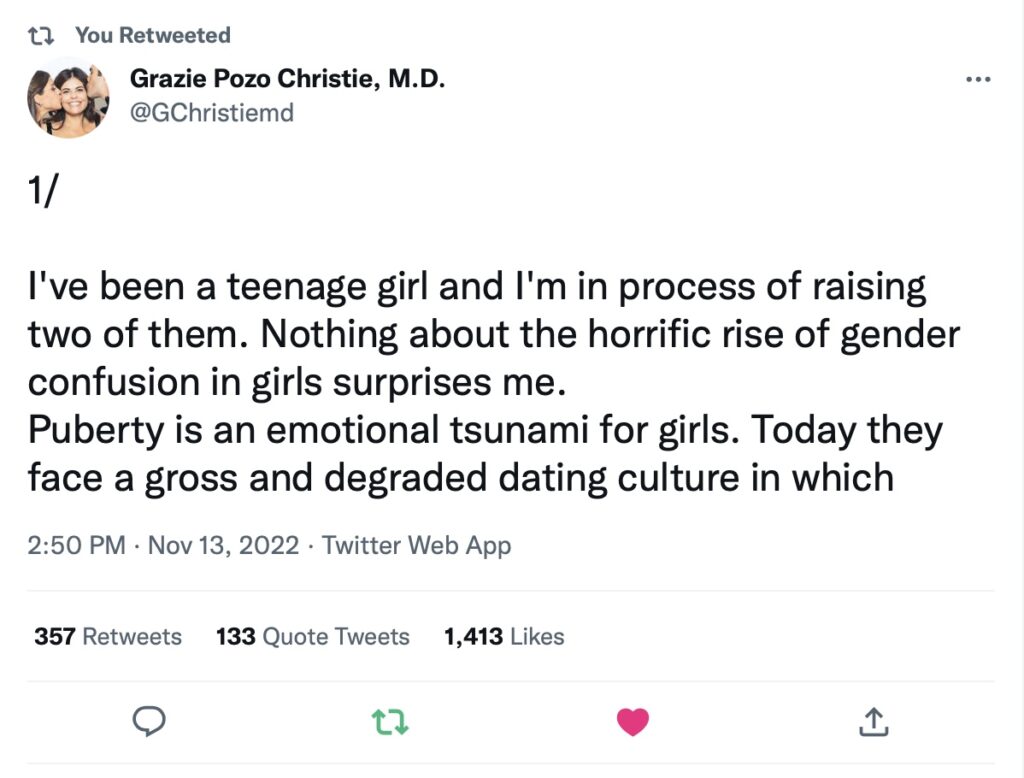The Correct Treatment for Gender Dysphoria
On the issue of gender dysphoria, I have followed Jesse Singal closely. I admire his willingness to dig deeply into the numbers and to let the numbers speak louder than the many one-size-fits-all "experts" out there (on both sides of the political spectrum). An enormous problem facing therapists and health care professionals is that the data is not clear yet. There are a lot of studies that are highly suspect for methodological reasons. Yet families are demanding treatment now and they want certitude. What should a therapist do when the evidence is not clear? To put it another way, where should they set their default? I'm not a therapist or health care professional, but I would set the default here: Don't surgically and permanently cut off an adolescent girl's breasts and inject her with male hormones (which will almost certainly render her sterile) when there is a reasonable possibility that the gender dysphoria is a consequence of other psychological and health issues that can be treated (or a consequence of cultural pressures). Do no harm. Singal recently summed up his current position, which is well worth considering:
My understanding of social transition is that it is a psychological intervention that may itself have downsides, such as making it harder for the kid to grow out of his or her gender dysphoria (I don’t think this is established, but I do think you can make a circumstantial case that it’s sometimes true from the available evidence). So even that shouldn’t be approached lightly — you should be certain the kid’s gender dysphoria is durable, severe, and causing problems. Is it “many” kids who fit these criteria? I dunno. Same deal with medical treatments. They really, really shouldn’t be taken lightly. The evidence base sucks, regardless of what major liberal media figures keep saying. A kid should go on blockers or hormones only if they’ve been assessed very carefully.I am concerned that much of what passes as dysphoria is cultural dissing of women, passed by contagion. The following Tweet thread was well articulated.
I don’t think there’s any evidence that treating gender dysphoria qua gender dysphoria with “therapy and medication” will do much good in most cases. I do think that in some subset of instances in which a kid tells a therapist they have gender questions, or definitely feel they are some “other” gender than their biological sex, basic exploration of other factors will reveal some other issue. Sometimes it might be recent trauma, sometimes it could be anxiety or depression, and sometimes it could be other issues involving, say, the onset of puberty. I think those issues probably can be treated with therapy and drugs, at least in a lot of cases, and that doing so may cause the gender issues to abate, because they weren’t the root issues in the first place.
There’s a lot of disagreement among clinicians over whether the causal chain (1) is always gender dysphoria → other psychological issues, or (2) whether it can sometimes go in the other direction. This is a pretty high-stakes question, because it obviously will affect the direction of therapy. If a kid has gender questions, anxiety, and depression, then a therapist operating under (1) will assume that ameliorating the GD will in turn ameliorate the other issues (so no need to pay them much mind at first), while a therapist operating under (2) will have more of a winding road to traverse.. ..
Anyway, all of this is to say that no, I haven’t been swayed from the idea that on balance, these treatments are probably good for kids who would otherwise suffer from severe, unremitting gender dysphoria. But even in these instances, no one should act like they know exactly what they’re doing. Sometimes even severe, prolonged cases of GD go away!
Much of this resonates with me. Society has, in many ways, belittled women. If you think this is overstatement, go turn on your TV. Our culture continues to do this in thousands of ways. If I were about to be born and you could choose your sex and you would be growing up in the United States, what is the likelihood that you would choose to be a girl in our current cultural stew?


